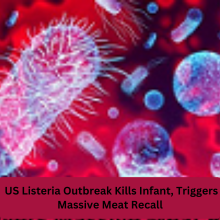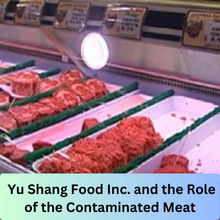
In a tragic turn of events, an infant has died, and 10 adults have fallen seriously ill due to a listeria outbreak linked to ready-to-eat meat products. This outbreak, which has affected multiple states, highlights the severe health risks posed by foodborne illnesses like listeriosis. As officials scramble to manage the outbreak, a recall of contaminated meat products has been issued, putting a spotlight on food safety practices and the importance of vigilant consumer awareness.
What is Listeria and How Does It Spread?
Listeria monocytogenes is a type of bacteria that can cause listeriosis, a severe infection primarily affecting vulnerable groups. This pathogen is commonly found in contaminated food, particularly in ready-to-eat meats, unpasteurized dairy products, and raw vegetables. The bacteria thrive in refrigerated environments, making cold storage foods like deli meats, hot dogs, and prepared salads prime suspects for contamination.
Listeria can spread through direct contact with contaminated food or surfaces, and in some cases, it can even be transmitted vertically from a pregnant mother to her unborn child. The bacteria can survive and multiply at low temperatures, which is why it poses a special risk to food products meant to be stored in the fridge.
Details of the Listeria Outbreak
This recent outbreak has spanned four states: California, Illinois, New Jersey, and New York. The Center for Disease Control and Prevention (CDC) reports that between October 2021 and July 2024, at least 11 people have been infected, with one tragic death—the infant in California—linked to the contaminated meat. The outbreak has been traced to products manufactured by Yu Shang Food, Inc., a company based in Spartanburg, South Carolina.
Among the individuals sickened, seven were from California, two from Illinois, and one each from New Jersey and New York. The CDC’s genetic analysis confirmed that the strain of Listeria found in the outbreak matched those found in the affected food products, pointing to a direct link between the contaminated meats and the infections.
Who is Most at Risk for Listeria Infection?
Listeriosis is particularly dangerous for certain groups of people. Pregnant women are at the highest risk, as the infection can cause severe complications, including miscarriage, premature delivery, or stillbirth. Newborns, like the infant who tragically died in this outbreak, are also highly vulnerable.
Older adults and individuals with weakened immune systems, such as those undergoing chemotherapy or living with chronic conditions, are also more likely to suffer from severe Symptoms of a deadly infection. Symptoms of listeriosis include fever, muscle aches, headache, stiff neck, confusion, loss of balance, and even convulsions. Pregnant women might experience only mild flu-like symptoms, but the consequences for their baby can be dire.
Yu Shang Food Inc. and the Role of the Contaminated Meat
Yu Shang Food, a producer of ready-to-eat meats, has been at the center of this outbreak. The company’s products, including seasoned chicken leg quarters and braised pork belly, tested positive for Listeria monocytogenes during routine inspections conducted by the U.S. Department of Agriculture (USDA) in October 2023. These inspections ultimately led to a recall of over 72,000 pounds of affected products.
The contaminated products were sold in at least four major retailers, including 99 Ranch Market. The outbreak’s connection to these specific products underscores the critical need for stringent food safety protocols in food processing and distribution.
What Products Have Been Recalled?
The USDA has issued a comprehensive recall of nearly two dozen varieties of meat products, including but not limited to:
- Braised Pork Belly in Brown Sauce
- Seasoned Chicken Quarter Leg
- Braised Beef Shank
These products were sold under the inspection numbers “P-46684” or “EST. M46684” and were produced before 28 October 2023. Consumers who have purchased these items are strongly urged to discard them immediately and thoroughly clean any areas where these products were stored.
The Investigation Process
The investigation into the source of the outbreak has been a collaborative effort between the CDC, USDA, and local health departments. One of the primary methods used in identifying the outbreak was genetic fingerprinting of the Listeria strain. This process involves analyzing the DNA of bacteria samples from infected individuals and comparing them to strains found in the contaminated food.
Once the link was established, the health authorities were able to trace the outbreak to specific batches of meat produced by Yu Shang Food, which led to the recall. The careful investigation process ensured that the source of the contamination was quickly identified and contained.
Impact on Public Health and Consumer Behavior
Foodborne illness outbreaks, particularly those involving Listeria, can have a significant impact on public health and consumer trust. After this outbreak, many consumers are likely to be more cautious about ready-to-eat meat products, especially those purchased from markets where the recalled products were sold. Trust in food safety practices can waver during outbreaks, and it is essential for companies to take swift action in addressing contamination risks.
What Should Consumers Do During an Outbreak?
Consumers should always remain vigilant and proactive when it comes to food safety. If you have purchased any of the recalled products, discard them immediately. It is also essential to clean and sanitize your refrigerator, freezer, and any surfaces that may have come into contact with the contaminated items.
If you experience any symptoms of listeriosis, particularly if you are pregnant, elderly, or immunocompromised, seek medical attention right away. Early detection and treatment are critical to managing the infection and preventing severe complications.
Also read: Chuck Woolery, Iconic Host of ‘Wheel of Fortune,’ Dies at 83
What is the Role of Food Safety Regulations?
Food safety regulations are designed to protect consumers by ensuring that food products meet specific health and safety standards. The USDA and CDC play pivotal roles in overseeing food production, inspecting facilities, and investigating outbreaks. These agencies help enforce food safety regulations and work with food producers to mitigate risks.
Regulations surrounding food inspections, labeling, and traceability are vital in preventing widespread contamination. While the current outbreak may have been traced back to Yu Shang Food, the industry as a whole needs to ensure that such incidents are minimized through better oversight and continuous improvement of safety protocols.
How Can Listeria Infections Be Prevented?
The most effective way to prevent Listeria infections is through safe food handling practices. Consumers should follow basic guidelines:
- Always wash hands after handling raw meat or food items.
- Store foods at the correct temperature and avoid consuming items past their expiration date.
- Clean your kitchen regularly, including cutting boards, utensils, and countertops, to avoid cross-contamination.
Food manufacturers should also invest in improving their food safety practices, ensuring that their production lines meet the highest hygiene standards.
What Does the Recall Mean for Yu Shang Food Inc.?
The recall and the outbreak have put a significant strain on Yu Shang Food, Inc. The company has temporarily suspended operations to address the contamination and to implement enhanced food safety measures. While the recall process and cooperation with authorities may help rebuild some consumer trust, the company must also focus on restoring its reputation through transparency and ongoing commitment to food safety.
Broader Implications for the Food Industry
This listeria outbreak serves as a critical reminder of the need for robust food safety systems. It highlights the need for transparency, regular inspections, and a rapid response to contamination risks. Going forward, the food industry may face stricter regulations and enhanced testing protocols to ensure that such outbreaks are prevented in the future.
Also read: Is Tesla Really Launching the Pi Phone? Find Out Now
Conclusion
In conclusion, the recent listeria outbreak tied to ready-to-eat meats is a sobering reminder of the risks posed by foodborne pathogens. While the affected individuals and families have faced severe consequences, the recall process and increased awareness will hopefully reduce future risks. By staying informed and following food safety guidelines, both consumers and food producers can play their part in preventing similar outbreaks.
FAQs
What is Listeria and why is it dangerous?
Listeria is a bacteria that can cause listeriosis, a serious illness that can be deadly, especially for pregnant women, newborns, and those with weakened immune systems.
How do I know if a product is part of a recall?
Always check the USDA recall website or look for recall notices from the CDC and other health authorities. Also, inspect product labels for inspection numbers.
What are the symptoms of Listeriosis?
Symptoms can include fever, muscle aches, headache, stiff neck, confusion, and diarrhea. Pregnant women may experience mild symptoms but can still pass the infection to their unborn baby.
What should I do if I have eaten contaminated meat?
If you feel ill after consuming recalled meat, seek medical attention immediately, especially if you are pregnant, elderly, or have a weakened immune system.
How can I protect myself from Listeria infection?
Practice safe food handling, including washing hands regularly, keeping your refrigerator clean, and avoiding consumption of unpasteurized dairy or contaminated meats.

